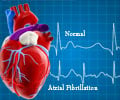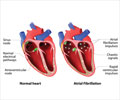Younger patients with Afib faced higher hospitalization rates for heart failure, stroke, or heart attack, along with elevated comorbidity and mortality rates.

Mortality, Hospitalization, and Cardiac Interventions in Patients With Atrial Fibrillation Aged <65 Years
Go to source). The study, which is among the first to examine a large group of Afib patients younger than 65 in the U.S., found that these younger patients were more likely to be hospitalized for heart failure, stroke or heart attack and had significantly higher rates of comorbidity and mortality, compared to similarly aged and gender-matched people who do not have Afib.
‘#Atrialfibrillation (Afib) is both more prevalent and poses greater risks in younger individuals than previously understood. #heartfailure’





“Common knowledge among cardiologists is that, in people under 65, Afib is extremely uncommon and not detrimental. But there really hasn’t been any data to back that up,” said lead author Dr. Aditya Bhonsale, M.D., M.H.S, a UPMC cardiac electrophysiologist in HVI’s Division of Cardiology who is also an assistant professor of medicine at the University of Pittsburgh. Atrial Fibrillation in Young Patients
“At UPMC, we've been seeing a lot more young patients with Afib in recent years and have been interested in understanding the real-world clinical course of these individuals. As a payer-provider with patient records across more than 40 hospitals, UPMC was uniquely positioned to ask this question, which no one has been able to ask before,” Bhonsale added.Drawing from the electronic health records of 67,221 UPMC patients seeking care for Afib from 2010 through 2019, the researchers found that more than a quarter of them (17,335) were under the age of 65, a stark contrast to the 2% prevalence commonly estimated. The high proportion likely reflects an increasing burden of cardiovascular risk factors in younger Americans, said Bhonsale.
The UPMC team found that over the course of a decade, survival rates for those with the arrythmia were 1.3 to 1.5 times worse for men with Afib, and 1.82 to 3.16 times worse for women, compared to similarly aged patients who did not have Afib. The patients studied also had high rates of cardiovascular disease risk factors, including smoking, obesity, hypertension and sleep apnea, which contribute to damaging structural and electrical changes in the heart over time.
“We are optimistic that data from this study will foster future investigation to evaluate optimal therapies for patients with Afib,” said senior author Sandeep Jain, M.D., director of cardiac electrophysiology in HVI’s Division of Cardiology who is also a professor.
Advertisement
- Mortality, Hospitalization, and Cardiac Interventions in Patients With Atrial Fibrillation Aged <65 Years - (https://www.ahajournals.org/doi/10.1161/CIRCEP.123.012143)
Source-Eurekalert











